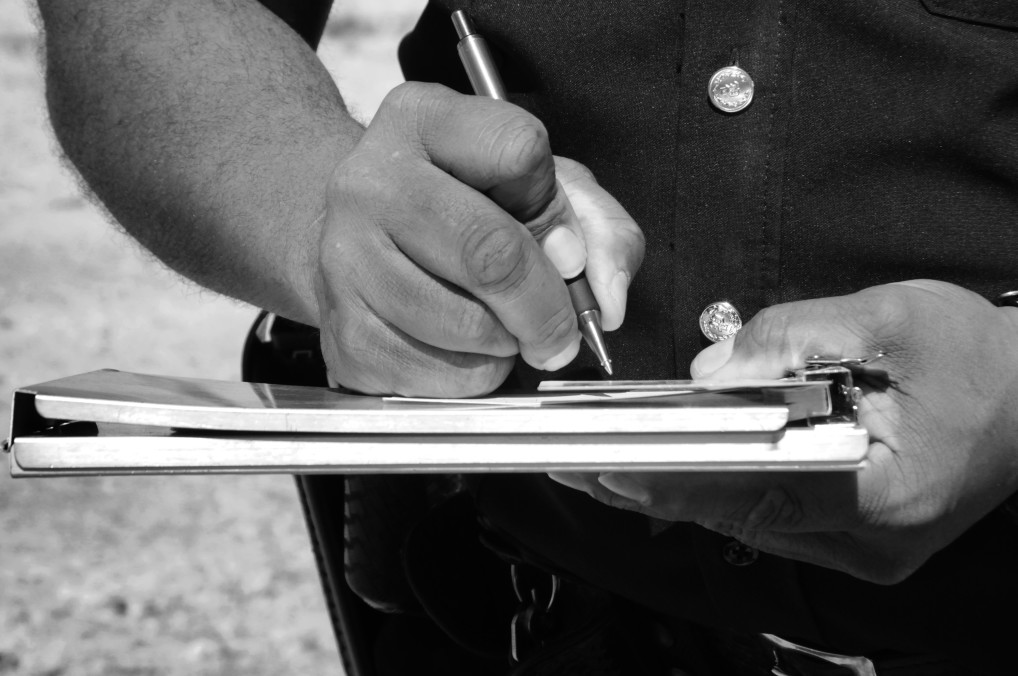Steps to Pay Online Florida Traffic Ticket
So, you’ve got yourself a traffic ticket in Florida. Congratulations on joining a special club that stretches from Pensacola to Miami – and to plenty of tourists as well!
The Sunshine State may even lead the country in terms of numbers of speeding tickets, according to the National Motorists Association. And it makes sense — drivers can encounter everything from theme park parking lots as large as some states; some of the most crowded urban interstates in the country, and all sorts of coastal highways and byways where it’s easier to watch the beautiful scenery instead of a rapidly-rising speedometer.
What to do with your Florida Traffic Ticket
Be patient.
Do not pay it right away. You have 30 days to think over your options. But don’t wait too long, after 30 days, the state begins applying fines and other possible penalties!
Be certain.
Paying can, however, lead to more “points” on your license. Too many points over a certain amount of time can lead to a suspension or revocation of your license from Highway Safety and Motor Vehicles. If you’re at this point or getting close, consider finding an online traffic school, which can reduce the number of points.
Make Payment.
You will also however, have to pay the ticket along with attending traffic school. Luckily, Florida makes it easy to pay tickets. Payment can be mailed in, dropped off at a county courthouse or a state Highway Safety and Motor Vehicles office, or online in some counties.
Steps To Pay Online Payments
Step 1. Check County
Check County with the county where the ticket was incurred if this service is available. If you can’t remember, the county name and instructions will be printed on the ticket. If you can’t find your ticket, contact the county where you believe it happened, and they’ll assist and either send you a reprint or at least tell you the payment procedure.
Step 2. Check Clerk List
Look at list of all 67 county clerk offices, provided by Florida’s Division of Library and Information Services. Here, you can get a geographic address, phone number and other contact information, such as email, fax or web site. The list doesn’t say whether any particular office offers online payment; this requires browsing or calling the office to ask about payment, the process and what site to visit.
Counties that do offer online processing make it fairly easy to find this information, such as Bay County, which provides a well-organized menu of fees and services, everything from license reinstatement costs to late fees.
As with most legal situations, the burden to properly comply is up to the person with facing the penalty, so excuses like “my email bounced back” or “my Internet was down” are rarely adequate.
3. Provide Info
If a county can securely process online payments through its site, it generally requests information from ticket-holders such as:
• Your valid recognized credit card
• Your ticket citation number and other information about it (day/time)
• Your driver’s license info
• Your full name
• The amount to be paid
Counties may also charge their own surcharge for local court/processing fees beyond the standard citation fee. This is usually no more than a few dollars.
By the way, those who don’t want to pay their ticket online, or at all, don’t have too many good options. Ignoring it can lead to a suspension of your license within a month and bigger fines as time goes by.
You can also contest it, which includes requesting a hearing, calling witnesses, discussing the law and presenting evidence on your behalf to a judge. It can be time-consuming and ultimately more expensive in terms or time and effort, even if it’s dismissed.
TX Defensive Driving Comedy
Everyone has a funny driving story. Some are unusual, some are silly – but no matter what type of driving story you have to tell, we’re sure that there’s some sort of entertainment value in it. And in the case that your driving story warranted a citation, there’s usually a
defensive driving course that can help reduce any fines, offset ticket points, potentially lead to lower insurance premiums and, above all, just give you the proper refresher on how to drive safely the next time you might be in a similar situation.
With that said, here’s a look at some of the funny driving stories we’ve heard in our defensive driving courses from students over the years:
Speeding to the Hospital to Have a Baby
You can never prepare for the exact time a baby will arrive, which is why it’s important to have the hospital bag packed and waiting by the door to grab as you run out the door around the due date. But what happens when your wife goes into labor at home and you’re in such a rush to get to the hospital that you forget her? That’s what happened to one of our former students, as he was pulled over by the police for speeding. When he explained that he needed to get his wife to the hospital to have a baby, he expected the police officer to say, “Follow me,” and light up the squad car. But the officer gave a bewildered reaction and calmly proclaimed, “I think you may have forgotten something.”
In the end, mom made it to the hospital with time to spare and gave birth to a healthy baby boy.
Um, That’s Not the Stick Shift
One of our students was taking their driving test in a manual transmission vehicle. The driving test instructor, per the usual, was sitting in the passenger’s seat. Things were going well until the student mistook the driving instructor’s thigh for the stick shift. Though a bit awkward at first, both the student and the instructor had a good laugh about it once they realized what had happened. The student wound up passing the test. Wink, wink.
Traffic Jam Karaoke
Though traffic jams aren’t usually met with excitement and laughter, that wasn’t the case with a recent student of ours. She was caught in rush hour traffic, combined with a traffic accident that blocked two of the three lanes of highway she was driving on. Needless to say, traffic wasn’t going anywhere fast as all the vehicles had to go from three lanes down to just one. But instead of letting the traffic jam get to her, this student cranked up the radio, rolled down the windows and changed the channel until she found a song she knew. Before she knew it, she realized that other drivers around her had done the same thing, and were belting out the same song. If you can’t beat the traffic, you might as well join it… in full-fledged song.
Ultimate Sledding
What do you get when you mix teenage hijinks with extreme sports? Ultimate sledding! One of our students told us a story about how he and his friends used to attach a sled and rope to his friend’s truck hitch and then they’d take turns sledding through neighborhoods after a nice snowfall. His fun came to an end one day when a resident phoned the police. They got off with nothing more than a warning, but were told that if they were caught again they wouldn’t be as fortunate. Oh well, albeit a bit dangerous, it sounds like a fun way to shovel the snow!
How to Check Traffic Tickets Online Florida
Waiting for the mail to arrive to check the status of your recent traffic ticket or when to pay it could take weeks. But you don’t have to wait that long. Thankfully, you can go online and track your citation’s status and then sign up for
Florida traffic school online if eligible. Doing so will give you peace of mind and speed up the process so that you move on.
DMV.org is a starting point for checking your ticket. Below we explore all the features of this website as well as look at other online option for keeping up with your traffic citation.
How can I find out more info about my traffic ticket?

If you click the link above, it will take you to the “Traffic Tickets in Florida” web page. There you can perform an up-to-date ticket history check to view your entire conviction history. You can also get information about Florida traffic school online. The online information includes your most recent infraction and the ticket that the law enforcement officer gave to you. If you feel that the information on the ticket is inaccurate or that you were falsely convicted of the citation, then you can contact the DMV or a local county court to find out what you need to do to contest the ticket.
What if I lost my traffic ticket?

If you lost the hard copy of your ticket, you can still check the ticket online and view all the information that was on the piece of paper. You can also check with the clerks of county courts to get a hard copy mailed to you. Charges may apply. Whether you get a hard copy of the ticket or look it up on the website, you’ll find that the information is precisely the same. You may want to order a hard copy, however, to verify that the data is the same.
What information can I find online about my traffic ticket?

Once you identify your ticket, you can view the details of the incident including:
• Vehicle Information. The officer who submitted the ticket will write down necessary vehicle information such as make/model of the car, license plate number, registration number.
• Violation. The ticket will provide the details about the driving offense. The officer will write down as much information as possible.
• Time / Place of Offense. The officer reports all logistics including date, time, and location.
• Officer Identification. The officer will provide his/her information such as name, badge number, and signature.
• Amount / Pay Deadline. The most vital details of the ticket are the amount of the fine and when the fine is due by.
Whose responsibility is it to manage my traffic ticket?

It is always your responsibility to take care of the traffic citation regardless of if the State of Florida, DMV, county clerk, or reporting officer makes a mistake. While this may create some frustration, you will nonetheless pay the consequences if the ticket is not taken care. The easiest way to “take care of your ticket” is by taking a FL BDI course, also known as a Basic Driver Improvement course or traffic school, or defensive driving course. Consequences could include penalties and fines or have your license suspended or revoked. For instance:
• Incorrect information on the ticket does not automatically negate the citation. Never assume that the erroneous information relieves you of your legal responsibility.
• If you do not receive information in the mail from the DMV, you are still required to the pay the amount of the fine by the due date.
• If the information online is not yet updated, it is still your responsibility to pay the fine by the due date.
• If you decide to contest the citation, you must do so within the time frame given by the state of Florida. The time frame is usually given on the back of the ticket along with the contest procedure.
What to Bring to My Florida Driving Test
If you are a first-time driver in Florida, you will need to pass both a written and driving exam before the DMV issues you a license. Upon passing a test, the State of Florida will deliver your license within two to four weeks of completion. When you arrive for your Florida driving test, you will need to bring some items with you.
Written Exam Requirements

To apply for a Florida driver’s license, you must first take a written exam. Although you must pay fees for license registration and driver exams, the written exams are free of charge. If you fail the exam and need to retake it, then you’ll pay $10 for each retake. Other than that, you simply show up and take the test. If you pass the test, you’ll then schedule a driving test.
Driving Test Requirements

The driving test will give you the opportunity to demonstrate necessary driving skills and follow fundamental traffic laws. You will need to provide a vehicle for the driving test. The DMV also requires you to bring the following documents:
• Valid Registration. You do not have to own the car that you are driving. Whoever owns the vehicle must provide valid updated registration. Current registration means that the car is registered in the same year that you are operating it for the test.
• Insurance Coverage. The owner of the car must provide proof of insurance from an insurance company in Florida. The insurance must be currently active. The vehicle must be covered by the minimum insurance allowed in the state of Florida.
• Vehicle Inspection. Before the facilitator gets in the car, he or she will inspect the car to make sure that it is both roadworthy and legal. Some examples of inspection may include making sure all the lights, and turning signals are operational, the tires are aired up to capacity, and the motor or transmission is properly running. You may also be required to perform an emission test on the vehicle.
• Retake Fee. If you fail to pass the test, then you will need to schedule a retake. The retake fee is $20. It must be paid before the facilitator administers the test. You can reschedule the test on the same day that you failed the initial test.
What Are You Tested On?

The objective of the driving test is to determine your ability to maneuver the vehicle in real life situations. Facilitators will often ask you to perform the road test in busy traffic throughout your home city. They want to know that you can drive in real scenarios around other drivers and pedestrians. Therefore, if you have a learner’s license, you should gradually work your way into operating the vehicle on the road with a licensed driver in the passenger seat.
The more you drive, the more you will improve your skills. You will drastically improve your chances of passing the test. You’ll be tested on specific maneuvers including:
• 3-point turn
• Parking
• Passing a vehicle
• Backing
• Giving right-of-way
Failure to perform one or more of the maneuvers above could cause you to fail your test. Therefore, you will want to prepare yourself for the day of the test.
✔ Get a good night’s rest the night before.
✔ Eat a healthy breakfast on the morning of the test.
Proper sleep and eating a good breakfast will help you concentrate during the road test. If you have practiced all of the required maneuvers over an extended period in real life situations, then you should pass the test with flying colors!
How Much is a TN Speeding Ticket?
Drivers in Tennessee who commit minor traffic violations – explicitly driving over the speed limit – will receive no more than a standard speeding ticket. When given a traffic citation, drivers have two choices. They can either decide to contest the traffic citation by submitting a plea of innocent or merely pay the ticket.
Paying a Speeding Ticket in Tennessee
Operators who are issued a speeding ticket by an officer will be required to pay the fine and all applicable fees (if any). There are three options for a paying the fine:
• Online at the proper website
• Mail the payment to the appropriate courthouse or agency
• Arrive in person to pay the fine using acceptable payment methods (cash, card, etc.)
Although online is the most convenient and efficient method to pay your speeding ticket, the state of Tennessee does not require it. Keep in mind, that paying online will process the payment faster if you are nearing the deadline and can’t mail the payment in on time or arrive at the courthouse.
Driving Violation Fines and Penalties in Tennessee
One of the most common questions that drivers ask is, “What determines how much money I’m going to pay for a speeding ticket?” Although there may be several variables that determine the amount of the fine, the primary factor is how fast you drive over the speed limit. For instance:
• Drivers who break the speed limit by one to five miles will pay an average of $42.00
• Drivers who break the speed limit by more than five miles pay an average of $82.00
In addition to the fines, a driver may be required to go to court for more severe driving offenses. Examples may include:
• Running a red light while speeding
• Speeding through a school zone while the caution lights are flashing
• Speeding that causes a collision
• Reckless driving while speeding
• Speeding while under the influence of drugs, medication, alcohol, etc.
In these cases, the fines and penalties will increase significantly. Drivers may also be required to pay additional penalties, court costs, defensive driving school fees, and other designated fines.
Accumulating Driving Points
In addition to penalties, drivers who violate speeding laws will also have to pay by having points added to their driving record. The nature of the offense determines the number of points added to a driving record. The following is a list of driving/speeding violations and how many points the state of Tennessee will add to the driving record.
• Child safety at risk – 8 points
• Reckless driving – 6 points
• The driver does not yield the right of way – 4 points
• Passing in a no passing zone – 4 points
• Speeding – 1 to 8 points
Drivers who receive speeding tickets and other offenses listed above can accumulate points quickly with multiple infractions. They will have the opportunity to apply for a driving school to remove some of the points and reduce the total amount. Drivers who accumulate more than 12 points on their driving record will receive a notice that the state of Tennessee has suspended their license.
Speeding Tickets and Insurance
A third way that drivers will pay for a speeding ticket is with increased insurance rates. Every insurance company is different with issuing elevated rates depending on the overall record of the driver. For example, if a driver has to pay several speeding tickets and loses his or her license due to the accumulation of points, the insurance would skyrocket for a period before it comes back down. A driver who gets a ticket once every five to ten years, however, will probably not see a bump in their rates. Check with your insurance company to find out their policies on speeding tickets.
How Long Do Points Stay on FL Driving Record?
Maintaining a clean FL driving record and taking a FL traffic school to dismiss a ticket is important for many distinct reasons. One of the main reasons is so that you can continue to drive without the risk of getting your license suspended. Another is so that you can get lower auto insurance costs on a monthly basis. The way that Florida keeps track of how well people have been driving over a set period of time is through the points system.
How Does the FL Points System Work?
Points are added to a driving record based on the type of traffic infraction that occurs. Most of the common ones, and some others, are assigned a points value and if a driver is given a traffic violation, the number of points that are assigned to that type of infraction is placed on their driving record. The points system is in place to help keep safe drivers on the road because if a certain number of points are on a license or if multiple infractions of the same kind occur within a given period, then some or all driving privileges may be lost by the driver.
The way it is set up is that the more severe the infraction is, the more points are added to the driving record of the individual. There are some infractions that can lead to an automatic suspension as well such as offenses that are drug or alcohol-related, failure to pay child support, street racing, and failure to pay fines for traffic violations. Otherwise, license suspension is specifically outlined in the law as follows:
• If 12 points are added to a record within 12 months, then driving privileges are suspended for 30 days.
• If 18 points are added to a record within 18 months, then driving privileges are suspended for 3 months.
• If 24 points are added to a record within 36 months, then driving privileges are suspended for one year.
What are the common point values and how long do they stay on the driving record?
It is important to understand what some of the common violations are and their point values, so you can not only know what to avoid on the roads but also try to determine what your current points are, if any. These are some of the most common traffic infractions and their corresponding points value for driver’s in Florida.
• Speeding up to 15 miles per hour over the posted limit – 3 points
• Speeding over 15 miles per hour over the posted limit – 4 points
• Speeding that results in an accident – 6 points
• Littering – 3 points
• Violating child safety restraining laws – 3 points
• Driving with an open alcohol container in your vehicle – 3 points
• Driving recklessly – 4 points
• Having a collision that resulted from a standard moving violation – 4 points
• Leaving the scene of an accident that has property damage over $50 – 6 points
• Illegally passing a stopped school bus – 4 points
Of course, these are just some of the more common violations but there are many more that have corresponding point values. The severity of the violation will determine how long the points will stay on your driving record. Most of the time, they will stay on your record anywhere from 3 to 5 years but violations that are more serious can stay on your record for up to 10 years. You can have some points removed by taking a course from an online traffic school FL, however. You should find out how many points you have from your official driving record and if you wish to get some removed, sign up for our FL traffic school.
How to Check CA Court Traffic School Status
If you are issued a traffic citation and complete a CA traffic school course, you will enjoy all sorts of benefits. Taking a CA traffic school course will mask the violation on your driving record and subsequently decrease your auto insurance rate. It will also teach you how to drive in a defensive manner.
However, you might not enjoy these benefits if you do not complete the course on time. Here’s a look at how traffic school certificates are sent to the court, why they are sent and how to check whether the court has received the traffic school certificate.
Why It is so Important to Finish Traffic School on Time
The CA court connected to your traffic ticket will keep your case open until the court due date, or if you opted to take traffic school, until the traffic school due date. Once this date passes, the court will close your case. If you completed your course on time, the points from your ticket will not go on your driving record. But if you did NOT complete on time… the points will go on your record and your auto insurance may also go up.
In some instances, there will be a hold placed on the person’s driving record. It is even possible for a referral to be issued to Revenue Services for payment.
Many Californians are under the impression that a “physical” proof of completion certificate must be submitted to the court. Although that is true for Florida, Texas and various other states, it is not the case for California… except for out-of-state violators! If you were just driving through CA or do not have a CA driver’s license, and received a ticket, you will have to submit a physical proof of completion certificate to your court.
How Traffic School Certificates are Transmitted and Processed
California classroom and online traffic school completion certificates are transmitted in an electronic manner. Once you complete the course the date and time is recorded and immediately sent to the CA DMV via the internet. This information travels from the DMV database to the individual’s traffic court’s database within 24 hours.
The message contains a read-only file that details the participant’s information, the traffic course completed, the date of completion and other helpful information.
Once the traffic school certificate is received by the court, it will be marked as received and your dismissal will be electronically processed. Particularly large CA courts will take upwards of multiple days or even multiple weeks to process your completion paperwork. However, the time frame for processing hinges on each unique court.
Check on the Web
Do not assume the CA court has received your traffic school certificate. It is best to check with the court just to make sure the electronic report was sent to the correct court. Head on over to this helpful website: http://courtcertservice.com/ to check on the status of your case. Select the county where you were cited for the traffic infraction. Enter the information about your traffic violation court case including your first and last name, date of birth, driver’s license number and case number. Click the “check status” option.
When in doubt, do not hesitate to pick up the phone and give the court a call. Reach out to the court in question and tell them you would like to check the status of your traffic violation. Provide the court clerk with your information and ask whether the traffic school certificate has been received. If it has been received, find out the date the court received it and write it down for your records.
Am I Eligible for Traffic School?
If you have received a traffic citation, you may be eligible to take traffic school or a defensive driving course. Taking one of these can help reduce the number of points on your license. This can help to lower your insurance rates, which may increase due to the ticket, and prevent your license from being suspended if you receive too many tickets. Each state has different requirements as to when and if you can participate in traffic school or a defensive driving course. Here is some information about traffic school eligibility in Arizona, California, Florida, Kentucky and New York.
Arizona
In Arizona, you can participate in a defensive driving course as long as you have not participated for a ticket issued in the past 12 months or sooner. The date is based on the issuance of the ticket for which you are taking the course, not the date in which you took the course. Also, if the ticket was issued because you were involved in a serious crash or fatal accident, you may not be eligible.
California
In California, you can complete traffic school once every 18 months for traffic infractions. This reduces one violation. If you were cited for multiple violations, only one can be removed with traffic school. Also, you must have been in a non-commercial vehicle to be eligible and your driver’s license must be valid. If you were cited for not having a valid license, in addition to other traffic infractions, you are not eligible for traffic school in the state of California.
Florida
In Florida, you can elect to attend traffic school if you were cited for a non-criminal moving violation using a regular driver’s license. If you hold a commercial driver’s license, you cannot attend this type of program. In Florida, you can attend traffic school or driver improvement courses once every 12 months to eliminate points caused by a ticket. However, you can only attend five times during your lifetime. As such, you must use your limited number of courses wisely. If you have participated in traffic school in other states prior to moving to Florida, it does not count against the cap. The five times only applies to Florida and your Florida driver’s license.
New York
In New York, you can participate in a Point & Insurance Reduction Program or (PIRP) to reduce points on your driving record and decrease your insurance. You can participate in PIRP once every three years. However, the program only reduces up to four points from your driving record that were present within the 18 months prior to you taking the course. But participating once every three years earns you a 10 percent reduction in your insurance premiums.
Kentucky
In Kentucky, you can participate in traffic school once every 12 months for minor traffic infractions. Major traffic infractions or criminal traffic infractions are not eligible. This removes one infraction from your driving record. To be eligible, you must not be under license suspension and must have a valid license. Non-licensed and out of state drivers are not eligible to participate in driving school in Kentucky.
Most schools offer traffic school or defensive driving courses to help you reduce minor traffic tickets from your driving record. However, the requirements for this vary from state to state. If you have received a traffic ticket, check with your state to find out what programs you may qualify for to help get the ticket removed from your record. This can help keep your insurance rates as low as possible.
How Much is A Speeding Ticket in Arizona?
Speeding Tickets in Different States:
The state of Arizona makes use of several unique methods to nab speeders. Arizona drivers must be aware of stationary traffic cameras, officer radar guns, unmarked police cars and beyond. If you are pulled over for speeding, you will likely receive a fine as well as points on your driving record/license.
It is important to note that specific speeding fines differ by city and county. As an example, someone caught speeding in Flagstaff will not face the same fine as someone who is nabbed speeding in Tucson. Additionally, those who have not been caught speeding in the past will likely face less of a fine than those who have received multiple speeding tickets.
Start Your Online Course Now to Dismiss Your Ticket
The table below displays the top 5 counties Arizona drivers get caught speeding in. Traffic school prices differ based on individual court diversion fees. Take a look at the ultimate savings here:
| Maricopa |
|
|
|
|
10-14 mph |
$250 |
$203.95 – $265.95 |
|
15-19 m.p.h. |
$300 |
$203.95 – $265.95 |
|
20+ mph |
$350-$450 |
$203.95 – $265.95 |
|
Traffic Camera |
$165-$200 |
$203.95 – $265.95 |
| Cochise |
|
|
|
|
10-14 mph |
$250 |
$103.95 – $253.95 |
|
15-19 m.p.h. |
$300 |
$103.95 – $253.95 |
|
20+ mph |
$350-$450 |
$103.95 – $253.95 |
|
Traffic Camera |
$165-$200 |
$103.95 – $253.95 |
| Mohave |
|
|
|
|
10-14 mph |
$250 |
$103.95 – $228.95 |
|
15-19 m.p.h. |
$300 |
$103.95 – $228.95 |
|
20+ mph |
$350-$450 |
$103.95 – $228.95 |
|
Traffic Camera |
$165-$200 |
$103.95 – $228.95 |
| Pima |
|
|
|
|
10-14 mph |
$250 |
$103.95 – $233.95 |
|
15-19 m.p.h. |
$300 |
$103.95 – $233.95 |
|
20+ mph |
$350-$450 |
$103.95 – $233.95 |
|
Traffic Camera |
$165-$200 |
$103.95 – $233.95 |
| Pinal |
|
|
|
|
10-14 mph |
$250 |
$103.95 – $233.95 |
|
15-19 m.p.h. |
$300 |
$103.95 – $233.95 |
|
20+ mph |
$350-$450 |
$103.95 – $233.95 |
|
Traffic Camera |
$165-$200 |
$103.95 – $233.95 |
For complete list of AZ Court Diversion Fees: Click Here
Show Arizona the Money

Police officers are required to follow nuanced guidelines when determining the value of a speeding ticket. However, in some instances, the officer will consider the driver’s level of resistance/compliance when determining the cost of the speeding ticket. In other instances, the officer will follow the specific formula that determines the cost of a speeding ticket. If it is determined that you were driving more than 10 miles per hour beyond the speed limit, the financial penalty for your ticket will rise quite dramatically.
A speeding ticket for driving 10 miles per hour beyond the speed limit runs $250. This cost increases $50 for every 5 miles per hour beyond 10 miles per hour above the speed limit.
A speeding ticket for driving 20 miles per hour over the posted speed limit can be increased by $200 more than the initial $250 fee. Driving at such a fast rate of speed can also result in the suspension of the driver’s license. It is even possible for the license to be revoked when the traffic stop occurs.
The amount of the speeding ticket can be changed according to whether the driver was nabbed speeding by one of the state’s stationary traffic cameras. This style of speeding ticket is sent through the mail. It requires the driver to pay a set cost of $165 along with an additional $30 in fees and surcharges.
Show Traffic School the Money – It’s CHEAPER!

It is usually less expensive to take and pay for AZ defensive driving course, not have any points added to your driving record and avoid having your insurance rates up than to pay your ticket, have points added to your record and have your auto rates increase dramatically.
Eligibility and More

Arizona allows residents to enroll in traffic school once every 12 months. When you take the course, it will only dismiss one traffic related offense. Be sure to look up fines and points for all violations (if you received more than one) before you tell the Traffic School which offense you want the school to dismiss.
Top violations:
Speeding: 3 points
Running a red light or stop sign: 4 points
Failure to yield: 4 points
Criminal Speeding

Speeding at an excessive rate, known as “criminal speeding”, can result in upwards of 30 days in jail and a $500 fine. Additional penalties for criminal speeding include paying to have the vehicle retrieved from the space it was towed to. Criminal speeding occurs when a driver goes 85 miles per hour or more anywhere in Arizona. A driver exceeding 35 miles per hour near a school crossing can also be found guilty of criminal speeding.
A driver who exceeds the posted speed limit by 20 miles per hour in a residential or business area can also be found guilty of criminal driving. If no speed is posted in a residential or business area, one driving 45 miles per hour or more beyond the speed limit will face the possibility of a criminal speeding charge. Aside from fines and possible jail time, such a charge can also impact one’s ability to legally operate a motor vehicle.
Answering common traffic school questions
Are you enrolled in traffic school and feeling a bit nervous about the expectations? If so, you are not alone. Most people experience some degree of anxiety. It is quite normal.
However, you should calm down. The goal of traffic school is to make you a safer driver. The curriculum is not set up for you to fail. Instead, quite the opposite is true. The institution wants you to comprehend the material as fully as possible. Your success is their success.
This all sounds well and good, but you also know that in the end you have to complete a certain amount of work with a passing score. Keep reading below to find out just where to turn for answers to your traffic school assignments.

Use this information to help get a passing score. Then, enjoy the safe driver record and dismissal of tickets. And, of course, do not forget the mandatory insurance discount.
I’m struggling with my online traffic school course, what should I do?
You would be surprised at how easy things can be when you use a little common sense. Just stop trying to make traffic school so difficult and all will be smooth sailing.
When things get tough, just sit back and relax. You have been a driver for some time now. The answer is probably the one that seems right to you. Use your intuition.
For example, the rules of the road exist to protect motorists and pedestrians. You already know this. So, use this knowledge to help you figure out the answers to your traffic school questions. If a choice does not help keep people safe on the road, then you can discard it.
Can I ask friends & family for help with my online traffic school?
The people around you, such as family and friends, are excellent sources of information on traffic laws. Many of them have been driving for decades and know all the rules in your state. Be sure to ask them for help when trying to complete your course.
It may be best to rely on more than one person for the answers. You will want a variety of opinions. Listen to what everyone has to say, check your course material again and then choose the best answer.
How can I use the internet as a source for answers with my traffic school online?
You should search the internet for relevant driving websites. Your state motor vehicle department will have the current rules of the road available online. Likewise, the state insurance department can provide you with information on auto insurance requirements.
Last, the state court website can explain what will happen if you break the laws while behind the wheel.
What about the instructor of the online traffic school course, can I ask them for help?
If truly stuck with nowhere to turn, then ask your instructor for help. Now, you should always be sure to have attempted to find the answer yourself first. Quite often, wayward students will skip the reading material or fail to follow instructions and then expect the instructor to bail them out.
Truly attempt the assignment before asking for the instructor to explain it to you. Doing so will make their explanation that much more comprehensible.
Traffic school success is right around the corner!
You are now prepared to complete your traffic school with flying colors. Just take things easy and you will succeed in becoming an acknowledged safe driver in your state.
Traffic School Daze vs. Real Traffic School
If you saw the Jamie Foxx Show, Season 2, Episode 10, when he goes to traffic school, you might be a bit anxious about signing up. Do not worry, the show was very much an exaggeration.
Sure the episode was extremely funny, but they got things wrong. You should relax and know that your school wants you to succeed. They will not be out to fail you as was the case for Jamie and Braxton!
Following are some of the realities of traffic school. You should be thankful things are a lot different than in the show.
You Cannot Bribe the School

When they arrive at the traffic school. Jamie tells his co-worker Braxton that they will not have to stay the entire time. He had heard from reliable sources that it is possible to pay off the school. In return, the instructor will claim the student completed the course, and the traffic infraction would be dismissed.
You better not attempt to bribe a traffic school official. They will not take the offer lightly. You may find yourself turned in to the authorities. Moreover, the state may decide to leave your traffic record as is.
In fact, the authorities may even add another violation to your record because of your unethical behavior.
The Instructor is not a DI

The instructor in this episode is a real character for sure. He obviously has watched a few too many military boot camp films. The students are told to address him as “sir!” He yells and threatens them regardless of what they do. It is the form of intimidation you expect of a drill instructor or prison guard.
Well, you can relax. Nobody will yell at you in a traffic school classroom. The instructors are there to help you pass. They will not treat you like a prison inmate.
And, if you are still a bit concerned that maybe you will get that one rogue instructor from the Jamie Foxx Show, then you can always take your class online. This means you will complete the course from the safety of your home. Nobody can yell at you via the computer screen.
You Can Ask Questions Freely
The traffic school succeeds when you succeed. They want you to be a safer driver. Thus, unlike the instructor in the show, the traffic school staff will answer your questions without personal attacks.
Nor will they get into your face in order to intimidate you. Fear is not a tactic used in the real traffic school classroom. Instead, expect to find compassionate instructors who enjoy their jobs.
No Ten-Hour Mandatory Sessions
Jamie and Braxton “belong” to the instructor for the next ten hours according to the show. Now, that is pure torture.
You will not have to endure such a long duration of traffic school at one time, unless that is your choice. Just sign up for the online version. You can start and complete sessions at your convenience. Too bad Jamie did not think of that?
No Pushups

Jamie had to do over 1000 pushups as punishment for his behavior.
Fortunately, you will never be told to perform any physical activity whatsoever. Just listen to the instructor, study your course material and it will be smooth sailing.
Nobody Goes Home Broken
Repeatedly throughout the show, the instructor tells Jamie and Braxton that he will eventually “break them” down. Supposedly, the students will get tired of the harassment and give up. For some reason that would be a plus to the television instructor.
In real traffic school, the instructors want you to enjoy all the benefits of course completion. Then, you will go on to tell others to attend the school.
They want to “make you” not “break you.”
What is a Sig Alert and How to Plan Travel Around It?
It has happened to every Southern California (SoCal) driver at one time or another. You wake up in the morning or get off from a long day at work. All you can think about is getting where you need to go. Perhaps you are even running a bit behind schedule.
Then, the worst possible thing occurs. There is a Sig Alert on the route you are taking! Too late now. You could be stuck for hours in some of the worst traffic in the nation.
Read on to find out how you can avoid this unfortunate fate by learning just what a Sig Alert is and how you can plan your route around one.
What is a Sig Alert?
Sig Alerts are traffic warnings that the authorities issue when they expect a major backup on the roads. They declare a Sig Alert situation when an incident causes two lanes or more to be unavailable for at least two hours.
Despite most SoCal freeways having multiple lanes, these debilitating Sig Alert incidents usually result in serious traffic jams. The first problem is the closed lanes. Vehicles must merge into other lanes, which stalls the flow of traffic. Second is rubbernecking. People always slow down to stare at an accident. The cumulative effect of just a few seconds of staring results in even further congestion.
History of the Sig Alert
The Sig Alert originated in the 1940s. Traffic was becoming worse as more Southern Californians began purchasing cars. Jobs in the burgeoning defense industry had put money into the pockets of many who before did not have disposable income.
Local police would notify Loyd Sigmon, a popular Los Angeles radio reporter, of bad accidents. He would then inform the public on his show. Eventually, the broadcasts became widely known as “Sig-Alerts.” The police then began sending the alerts via electronic devices to Sigmon and other journalists.
Today, the California Highway Patrol (CHP) issues these warnings to both the media and public via a vast array of communication networks.
How to Avoid Traffic Congestion
Always check for ongoing Sig Alerts before leaving your home or workplace. Furthermore, keep checking while on the road. Quite often, you can make a hasty detour before getting into the proximity of a Sig Alert zone.
Where to Get Information
You are very fortunate that in this age of fast communication, the authorities have many ways to broadcast Sig Alerts. In the past, motorists had to be listening to the Loyd Sigmon Show to know what was going on.
These days, to find out about alerts, you can watch the television news. All SoCal news shows have routine traffic reports during the morning and afternoon rush hours. These stations also have websites that update as road conditions change.
The California Highway Patrol posts Sig Alerts on its website as well. If you are driving, look for warnings on the electronic message boards above the highways.
Also, local radio stations still announce Sig Alerts to keep listening to audiences informed.
Last, but certainly not least, you can download a Sig Alert notification program for your mobile device.
Avoid an Accident
The only thing worse than being trapped on a highway in Sig Alert-related traffic is being the source of the alert itself.
You can lessen your chances of causing an accident by attending traffic school. Be sure that the course is recognized by the state. You may even be able to receive a dismissal of any outstanding traffic tickets.
How Precise Is an Online Auto Loan Calculator?
If you are thinking about buying a new or used automobile, you may be looking at online auto loan calculator to determine what you can afford to pay. These types of loans will help you calculate your auto loan payments based on the amount of loan and estimated APR you think you can get on your interest rate, giving you a general idea as to how much car you can afford. But, you may have many questions about basing a loan using these types of systems. Here is some information you will need to know.
Can You Trust an Online Auto Loan Calculator?
Yes and no. An online auto loan calculator is a great way to determine approximately how much car you can afford. If a car is $10,000 and you think you can get approved at 5.9 percent APR, the auto loan calculator will tell you what your payment will be if you take the loan out for three years, four years or five years. However, in reality, your car may be slightly lower or higher than the numbers you ran, you may get a higher or lower APR, your payments may not last a full three or five years or you may not include taxes, fees and licensing into your calculations. As you may learn in
traffic school or a defensive driving course, they are a great tool but they are not perfect.
What Factors Cause the Online Auto Loan Calculator to Vary?
As was mentioned above, there are many factors that can cause the online auto loan to vary. The largest is that there is no way to determine how much money you will need to pay for taxes, fees and licensing. As such, there is no way to include this information. This can be a couple of thousands of dollars, depending on the state you live in, and is typically rolled up into your payments. This can drastically affect your monthly payment and the interest you pay.
Another factor is your down payment. You may not include your down payment into the equation when doing one of these calculators. However, it should be. It affects how much you will have to pay over the life of the loan and the interest rate.
Lastly, the features you are guessing on cause the auto loan calculator to vary. When you are using this tool, you often put in whole numbers. You may put in $20,000 for a car, but in actuality, the car may be $21,999 or $18,599. These factors can cause the amount you are shown on the calculator to vary.
How Much Do Payments Usually Change in Reality?
Payment calculators are great at giving you an estimated amount that you will pay for a car. But they don’t give you an exact amount. The exact amount can vary heavily if you over or underestimate the amount of interest you are paying on a car or the amount the car will cost. However, if your numbers are relatively close, you can expect that the payment will be within $100 of the amount you are quoted on the screen. If your estimates are extremely off, your payment can vary more than this. Talk with a dealer to get an exact number if money is your primary concern.
If you are looking to obtain an auto loan, you may play around with an online auto loan calculator to get an idea as to how much car you can afford. However, these calculators should be taken with a grain of salt. They can give you a rough estimate as to how much you can expect to pay, but they can’t give you an exact amount. There are too many variables that can change and affect your exact monthly price.
How Do Other Countries Dismiss Traffic Tickets?
In the United States, if you are cited for a traffic infraction, this infraction shows up on your driving record. However, depending on where you reside, you may be able to take traffic school every one to three years to have one ticket, such as a speeding ticket, red light infraction or other similar ticket, removed from your record. This may leave you wondering if this is standard in all parts of the world or how other countries dismiss tickets. Here is more information about dismissing or removing tickets from driving records in other parts of the world.
United Kingdom
In the United Kingdom, they work on a points system that is very similar to those used in the United States. You get a certain number of points and once you exceed that points value, your license can be suspended. However, in the United States, you can take traffic school to remove one of these tickets and the points from your record. This is not an option in the United Kingdom. They only way to prevent points from hitting your record is to fight a ticket or not to get a ticket in the first place, unless you received a speeding ticket. Speeding ticket offenders can avoid a speeding fine, points and/or court by taking a 4-hour Speed Awareness Course.
For other traffic offenses, the UK’s National Driver Offender Retraining Scheme (NDORS) offers a range of courses which are designed to cover most low level moving traffic violations.
Australia
In Australia, the traffic ticket system is set up like it is in the United States. Each state has their own set of rules and laws. Just like in the United States, most states do have a points system in place. If you get too many points on your driving record for traffic infractions, your license will be suspended. However, just like in the US, in most states, you can attend traffic school to remove one ticket from your record. Once again, the frequency with which you can attend the school or take the course varies from state to state. Some are two years and others are four. And the number of points dismissed varies by state. However, if a state allows it, it’s a great way to remove unwanted points from your record.
Germany
Germany is another country that issues points based on the citations you receive while driving. These points can remain on your record for 2 1/2 years up to 10 years. If you receive a large number of points, your driving license will be suspended and you must go through a psychological examination to attempt to get your license back. While this state does not allow traffic school, you can get points removed from your record by taking part in formal training schools that are offered by the government in the country, in certain cases. A judge has to approve the training class and the removal of points based on what your offense was.
Italy
Italy has one of the most unique driving systems around. Drivers automatically start with 20 points on their driving record. If they drive well for two years, they receive two additional points, up to a maximum of 30 points. If they receive an infraction, they lose points. If they lose all their points, they can have their license suspended. Italy does not offer driving school or any other form of training. The only way to earn your good points back is by driving safely and following all traffic laws.
Every country has different laws when it comes to driving, driving infractions and licensing. Learning about the different country will help you see how strict your area is or how laid back it is compared to various countries around the world.
How to get a speeding ticket off your driving record
Speeding tickets tend to happen when you least expect them, and when your funds seem to be at their lowest. But there’s a much bigger danger beyond just your rapidly shrinking bank account — points on your license. Tally up enough of those points, and you may find yourself not only broke but also on the bus. But there are ways that you can get a speeding ticket wiped entirely from your record completely.
What is the best way to fight a traffic ticket?

Every state in the nation has their own way of handling speeding tickets, with some being more lenient than others. There are certain things that stay the same across the US if you plan to fight the ticket. For all states, you’ll have a chance to tell your side of the story if you feel there was a mistake made when issuing the speeding ticket. For example, if you know you were going 55 miles an hour when the officer clocked you at 65, then his radar gun or detection device may have been poorly calibrated or just plain broken. Always plead not guilty in any court of law if you intend to fight. In all states, you’ll need to fill out the proper paperwork and pay the court fees to get your record and plead your case.

When you argue your case in either a conference or a court, you need to know the regulations that will help you win. For example, radar units are supposed to be calibrated before every shift, and before and after an officer uses it to clock a speed. These types of stringent requirements are difficult to follow for a busy speed trap, so you may be more in luck than you think. Evidence like camera footage may help you prove that the light was yellow by the time you crossed into the intersection. The court will consider your past driving records to help make their decision, so highlight any good behavior on the road too. You also can hire a lawyer who may be able to use their skills and expertise to get your ticket completely cleared for your record too.
What are the benefits of taking online traffic school?

Traffic school is offered in most states as a way to clear your record. Depending on the severity of your offense, it may be mandated that you take these classes. Typically, you’ll want to plead guilty if you intend to take the classes, but you don’t have to. For example, in California, you can still fight the ticket and potentially have the option to take traffic school if a judge allows it. However, the judge does not have to justify their decision to you if they don’t allow you to take driving school, so bear this in mind if you’re weighing your options.

If you live in the states of Arizona, Florida, California or Texas, you can have the ticket dismissed entirely if you take traffic school. If you live in New York state, traffic school will take up to 4 points off your license. Arizona, Florida, and Texas will only allow you to take the traffic school option once a year. In California and New York, it’s up to 18 months. You should have had only one moving violation, and it must be for a speeding ticket as opposed to reckless driving to get the points removed. Another major bonus in taking traffic school is that you may be able to reduce the cost of your insurance as well as get the points removed.
How to Get a Traffic Ticket Reduced
To put it bluntly, traffic tickets are hell. You wind up paying exorbitant fines because some municipalities are increasing the amounts to raise revenue. Moreover, the police are more vigilant than ever about catching motorists in the wrong. If all of this is not bad enough, never forget about the cameras that photograph your car speeding and send the pictures to you in the mail, along with a large bill.
So what can the average driver, such as yourself, do to survive in this age when “Big Brother” is watching their every move on the roads? Well, the answer is to enroll now for a defensive driving course. Not only will you receive pertinent information on how to remain safe behind the wheel but also a possible reduction of license points and having your ticket reduced or dismissed.
The Driving School of Today

You might at first be a bit wary of the advice to attend driving school. After all, you are probably a busy person. When do you have time to sit in a classroom?
Well, scheduling classes is no longer an issue. The driving school of today can take place either in a traditional brick and mortar building or online. You can have online class wherever and whenever convenient. In fact, many families and coworkers enroll in group classes to motivate each other to complete the courses.
Ticket Reduction

Most states allow those who completed a defensive driving course to have their traffic tickets dismissed.
The school should be recognized by the state. Moreover, the instructor must be certified by the authorities and the course most be for a certain number of hours. Check with your driving school to ascertain the specific requirements in your jurisdiction.
Upon completion of the course, motorists may receive ticket dismissal, license point reduction and automobile insurance discounts.
Defensive Driving vs. Traffic School

Be careful when enrolling. Some states define the two kinds of schools differently. In New York and Florida, you will be taking a defensive driving course to have your traffic ticket points reduced.
Arizona dismisses certain traffic violations after a motorist completes an approved defensive driving course. In contrast, traffic school is for serious violators ordered to take classes by the courts.
Meanwhile, California uses the two names interchangeably.
Going to Court

Americans have the right to defend themselves in a court of law. Some choose to do so when presented with a traffic ticket. They want to fight it out with the city to get the infraction removed from the record.
In certain cases, these challengers are successful. A California physicist was able to use scientific principles to win. He demonstrated that a police officer, situated at a certain angle, perceived his car to have run a stop sign when in fact it had stopped. In other instances, an alleged violator can win by default when the officer who presented the ticket does not show up in court.
Nevertheless, these victories are few and far between. Motorists usually wind up having to pay the fine and possibly some court costs.
Defensive driving school is the easier route without a doubt. Just enroll, finish the course and the violation disappears.
Enroll and Get on With Life
Everyone wants to save money. One way you can do so today is by enrolling in a state approved defensive driving school. You can have your ticket dismissed, removing the fine. Better yet, your driving record will be wiped clean, leading to a reduction in your insurance premium rate.
Perhaps best of all, you will learn some driving skills that can help you avoid getting tickets in the future.
























 Live Chat
Live Chat



